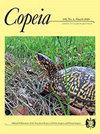A New Species of Lepadichthys from the Central South Pacific and Comments on the Taxonomic Status of Lepadichthys springeri Briggs, 2001 (Gobiesocidae)
IF 2.6
Q2 Agricultural and Biological Sciences
引用次数: 4
Abstract
Lepadichthys conwayi, new species, is described on the basis of 42 specimens (13.0–42.0 mm in standard length [SL]) collected from the central South Pacific and characterized by the following combination of characters: head sensory canal pores well developed, including 2 nasal, lacrimal and postorbital, and 3 preopercular pores; 13–16 (modally 15, rarely 16) dorsal-fin rays; 11–14 (12, rarely 14) anal-fin rays; 27–30 (28) pectoral-fin rays; 8 or 9 (9), 8–11 (9), and 8–11 (9) gill rakers on first to third arches, respectively; upper end of gill membrane level with base of 7th to 10th (usually 9th) pectoral-fin ray in lateral view; disc length and width 15.0–17.1 (mean 16.0) and 11.1–16.1 (13.9) % SL, respectively, disc length plus disc width 27.8–33.2 (30.0) % SL; dorsal and anal fins with very weak membranous connections to (rarely separated from) caudal fin, posteriormost points of membranes usually just short of or just reaching vertical through caudal-fin base, otherwise very slightly beyond fin base; dorsal- and anal-caudal membrane lengths 3.4–7.1 (4.8) and 3.0–6.0 (4.8) % of caudal-fin length, respectively; black stripe on snout tip through eye to posterior region of head. In addition, examination of the type specimens of Lepadichthys springeri Briggs, 2001 revealed them to be conspecific with L. misakius (Tanaka, 1908), a valid species recently resurrected from the synonymy of L. frenatus Waite, 1904. Accordingly, L. springeri is regarded as a junior synonym of L. misakius.南太平洋中部鳞鱼属一新种及对2001年春鳞鱼属分类地位的评析(虾蛄科)
摘要根据在南太平洋中部采集的42个标本(标准长度13.0 ~ 42.0 mm [SL])描述了一新种:头部感觉管孔发育,包括2个鼻孔、泪孔和眶后孔,以及3个眼前孔;13-16(模态15,很少16)背鳍射线;11-14(12,很少14)肛门鳍鳐;27-30(28)条胸鳍;8或9(9),8 - 11(9)和8 - 11(9)鳃耙分别在第一至第三弓上;鳃膜水平的上端在侧面具有第7至第10(通常第9)胸鳍射线的基部;椎间盘长度和宽度分别为15.0 ~ 17.1(平均16.0)和11.1 ~ 16.1 (13.9)% SL,椎间盘长度加椎间盘宽度27.8 ~ 33.2 (30.0)% SL;背鳍和肛鳍具非常弱的膜连接到(很少与)尾鳍,膜的最后方点通常刚短或刚到达垂直通过尾鳍基部,否则非常稍超过鳍基部;背侧和肛管尾侧膜长度分别占尾鳍长度的3.4-7.1(4.8)%和3.0-6.0 (4.8)%;黑色条纹在鼻尖通过眼睛到头部的后区域。此外,对2001年春鳞鱼(Lepadichthys springeri Briggs)模式标本的检查表明,它们与L. misakius (Tanaka, 1908)是同一种,后者是最近从L. frenatus Waite, 1904年的同义种中复活的一个有效物种。因此,春栗草被认为是misakius的初级同义词。
本文章由计算机程序翻译,如有差异,请以英文原文为准。
求助全文
约1分钟内获得全文
求助全文
来源期刊

Copeia
生物-动物学
CiteScore
2.10
自引率
0.00%
发文量
0
审稿时长
6-12 weeks
期刊介绍:
Founded in 1913, Copeia is a highly respected international journal dedicated to the publication of high quality, original research papers on the behavior, conservation, ecology, genetics, morphology, evolution, physiology, systematics and taxonomy of extant and extinct fishes, amphibians, and reptiles. Copeia is published electronically and is available through BioOne. Articles are published online first, and print issues appear four times per year. In addition to research articles, Copeia publishes invited review papers, book reviews, and compiles virtual issues on topics of interest drawn from papers previously published in the journal.
 求助内容:
求助内容: 应助结果提醒方式:
应助结果提醒方式:


